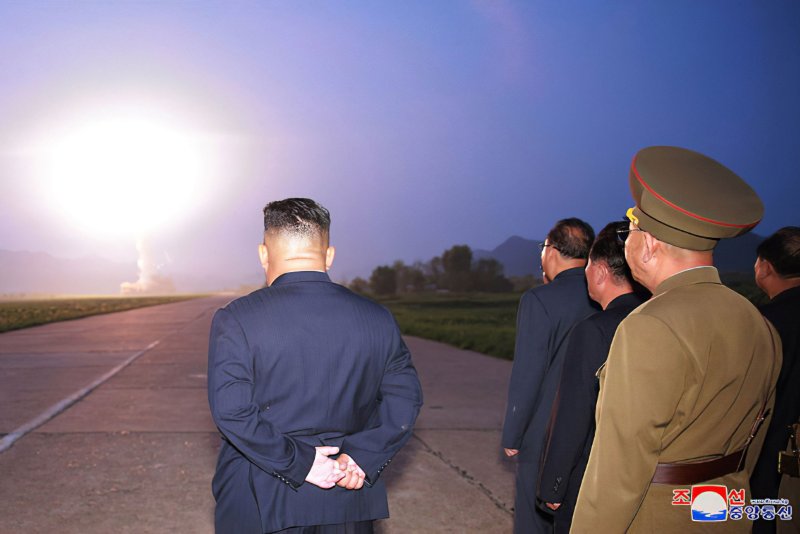This image, released Aug. 7 by the North Korean Official News Service (KCNA), shows North Korean leader Kim Jong Un overseeing the country's fourth series of missile launches in less than two weeks a "warning" to South Korea and the United States over an ongoing joint military exercise. File Photo by KCNA/UPI |
License Photo
SEOUL, Oct. 15 (UPI) -- As nuclear negotiations between North Korea and the United States remain at a stalemate and Pyongyang continues to launch new missiles, Washington should put Kim Jong Un's willingness to denuclearize to the test, defense analyst Bruce Bennett of research institute RAND Corp. said Tuesday.
Speaking at a forum at Seoul's Asan Institute for Policy Studies, Bennett said that despite repeated promises, Kim Jong Un has not taken any significant steps to denuclearize and has in fact increased his nuclear capacity since the failed Hanoi, Vietnam, summit between Kim and U.S. President Donald Trump in February.
"Has Kim given up one nuclear weapon yet?" Bennett said. "Has he shut off production at one production facility, let alone taking it down? No, he hasn't done that. Quite the opposite. According to my estimates, since the March of last year, Kim Jong Un has increased his nuclear destructive potential about 50 percent."
North Korea has about 45 nuclear weapons, Bennett estimated.
"From an American perspective, it looks what we call 'bait and switch,'" Bennett said.
The analyst said that Washington should test whether Kim is willing -- or able -- to live up to his denuclearization pledge.
"President Trump should say to Kim Jong Un: 'Prove to me that you're serious,'" said Bennett. "Take one nuclear weapon. . . we'll send in American, British and French teams of nuclear specialists. They'll work with your personnel to take apart that weapon. Get rid of it.
"If Kim is not prepared to do that today, when will he ever be prepared to [dismantle] one out of 45 weapons he can clearly afford? Unless he doesn't want to do it himself. And there's reason to believe that's the case."
Bennett added that Kim may also not have the power to unilaterally dismantle a weapon if he doesn't have the support of the country's military elites.
"We always assume he's very powerful, that he can do whatever he wants to," said Bennett. "But can he really do anything he wants to, especially with nuclear weapons? Let's test and see."
In return, the United States can offer limited sanctions relief, said Bennett, such as reopening the Kaesong Industrial Complex, the joint inter-Korean manufacturing zone that was shuttered in 2016.
Bennett said he would also offer to invite the International Atomic Energy Agency to send inspectors into South Korea to confirm that there are no American nuclear weapons hidden in the South and to set a precedent for verification on the Korean Peninsula.
Negotiations between North Korea and the United States have stalled since the February Trump-Kim summit ended abruptly without an agreement, as both sides remained far apart on timing and details of denuclearization and sanctions relief.
A working level meeting on Oct. 5 in Stockholm, the first official talks since Trump briefly met Kim at the inter-Korean border in the DMZ in late June, broke down in hours with the North Korean side complaining that the United States remained inflexible.
"While having so far hinted at a flexible approach, new method and creative solution, the U.S. has heightened expectations," said North Korea's chief negotiator, Kim Myong Gil. "But it came out with nothing, greatly disappointed us and sapped our appetite for negotiations."
North Korea has continued to launch new missiles since the Hanoi summit, including its first submarine-launched ballistic missile, on Oct. 2.
Pyongyang has also tested a new type of short-range ballistic missile on several launches since May, which analysts have said is similar to Russia's Iskander missile. The missile is capable of complex flight patterns that make it much more difficult for missile defenses to detect and intercept.
U.N. Security Council resolutions ban North Korea from conducting any kind of ballistic missile launch.
Bennett said that it's important to emphasize the serious threat that North Korea poses to South Korea and potentially the United States, one that will continue to grow as Pyongyang develops its nuclear and conventional arsenal.
Bennett estimated that one nuclear blast from a 230-kiloton nuclear warhead, the size that North Korea tested in September 2017, would cause roughly 3 million casualties in Seoul or New York.
He added that North Korea's new Iskander-type missile would potentially be able to destroy eight or nine of the South Korean military's 12 air bases.
"My bottom line is we need to be more proactive in trying to address this threat," Bennett said. "This is a serious threat and we need to take it seriously in order to justify the things we have to do to fix the problem."















